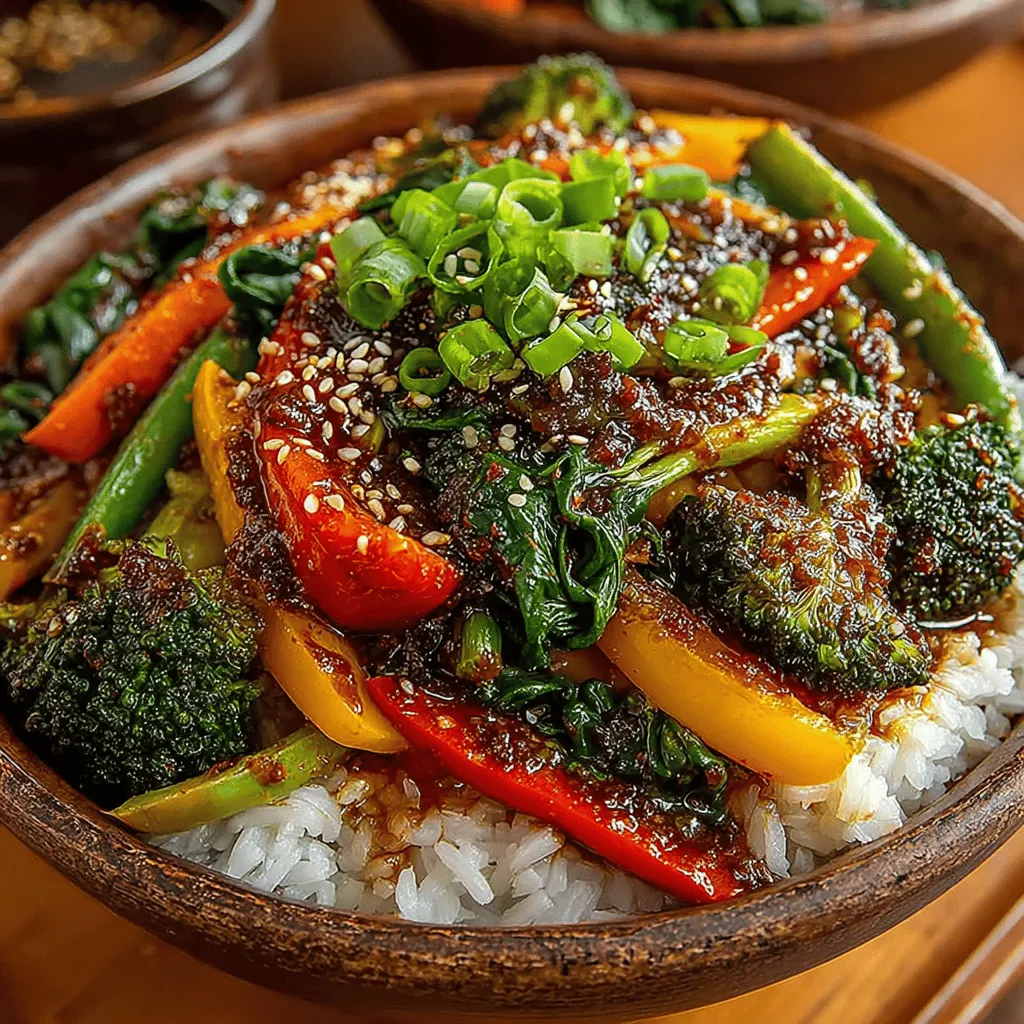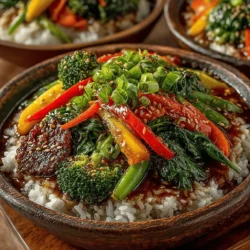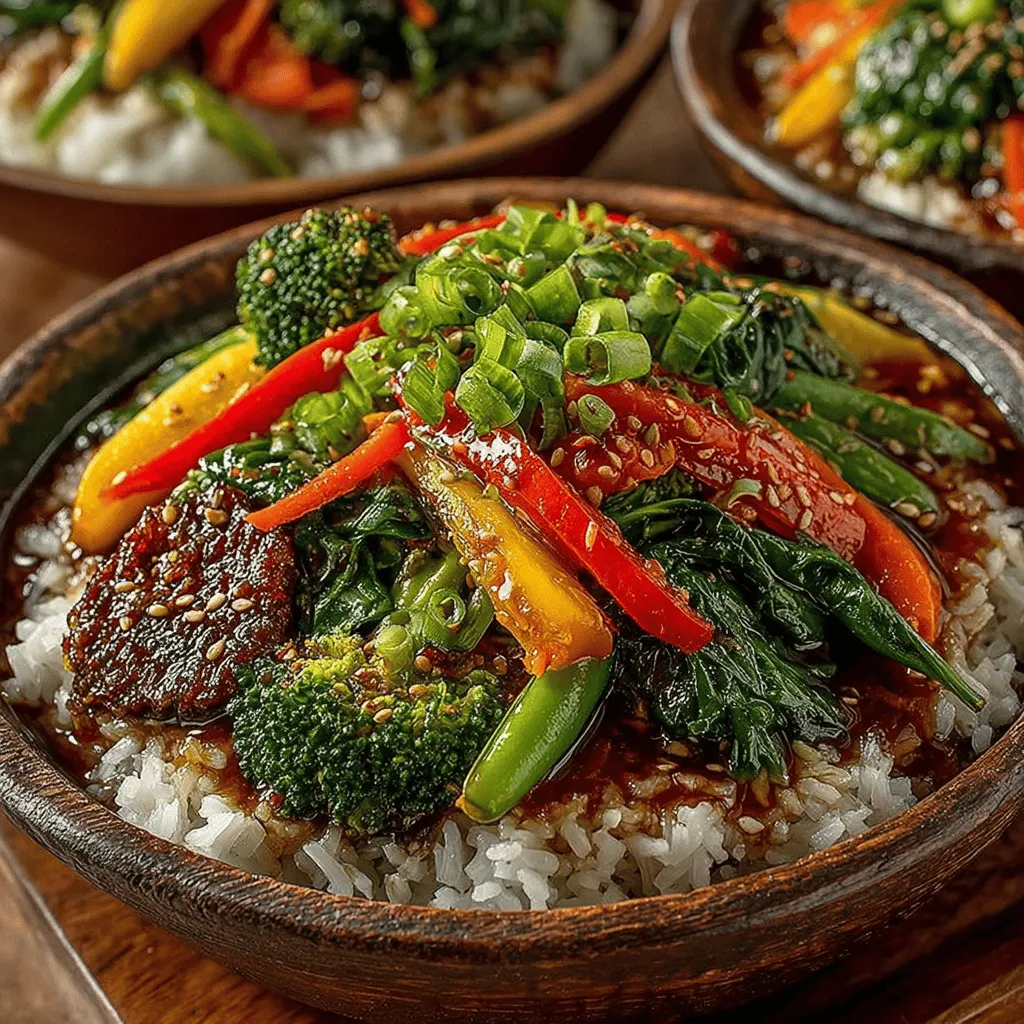Introduction to Quick Veggie-Packed Stir-Fry Bowls
In today’s fast-paced world, finding nutritious meals that can be whipped up in no time is essential. Quick veggie-packed stir-fry bowls offer a perfect solution for busy nights, combining vibrant vegetables with wholesome grains for a satisfying dish. This recipe is not only quick and easy but also customizable, allowing you to add your favorite ingredients. Whether you’re a seasoned cook or a beginner, this flavorful meal can be on your table in just 20 minutes, making it an ideal weeknight dinner.
Ingredients
– 1 cup jasmine rice or quinoa
– 2 cups water or vegetable broth
– 1 tablespoon olive oil or sesame oil
– 1 medium onion, diced
– 2 cloves garlic, minced
– 1 bell pepper, sliced
– 1 cup broccoli florets
– 1 cup snap peas
– 1 carrot, julienned
– 3 tablespoons soy sauce or gluten-free tamari
– 2 tablespoons hoisin sauce
– Optional toppings: sesame seeds, green onions, or crushed peanuts
Instructions
1. Rinse the jasmine rice or quinoa under cold water until the water runs clear.
2. In a medium saucepan, combine the rinsed rice or quinoa with water or vegetable broth. Bring to a boil, then reduce the heat, cover, and simmer until the grains are cooked (approximately 15 minutes for rice and 12 minutes for quinoa).
3. While the grains are cooking, heat olive oil or sesame oil in a large skillet over medium heat.
4. Add the diced onion and sauté for 2-3 minutes until translucent.
5. Stir in the minced garlic and cook for an additional minute until fragrant.
6. Add the sliced bell pepper, broccoli florets, snap peas, and julienned carrots to the skillet. Stir-fry for about 5-7 minutes or until the vegetables are tender-crisp.
7. Pour in the soy sauce and hoisin sauce, tossing everything to combine and coat the vegetables evenly.
8. Once the grains are cooked, fluff them with a fork and divide them into serving bowls.
9. Top each bowl with the vegetable stir-fry mixture and garnish with optional toppings like sesame seeds, green onions, or crushed peanuts.
Understanding the Ingredients
Exploring the Base: Jasmine Rice and Quinoa
Jasmine rice and quinoa serve as the wholesome foundation of this dish. Jasmine rice is a fragrant long-grain rice known for its nutty aroma and slightly sticky texture, making it an excellent pairing for stir-fried vegetables. Quinoa, on the other hand, is a protein-rich, gluten-free grain that provides a hearty texture and a diverse range of nutrients. It is an ideal choice for those with dietary restrictions, as it contains all nine essential amino acids.
The Importance of Fresh Vegetables
Fresh vegetables are the stars of this quick stir-fry, adding color, crunch, and essential nutrients to your meal. Bell peppers, rich in vitamin C, broccoli, a source of fiber and vitamins K and C, snap peas, providing antioxidants, and carrots, loaded with beta-carotene, all contribute to a healthful dish. Incorporating a variety of vegetables ensures a broad spectrum of vitamins and minerals, making your quick meal not only tasty but also nutritionally balanced.
Flavor Profiles: Oils and Sauces
The choice between olive oil and sesame oil is significant in this recipe. Olive oil is known for its heart-healthy monounsaturated fats, while sesame oil adds a unique nutty flavor that enhances the overall taste of the stir-fry. Soy sauce and hoisin sauce act as flavor enhancers, adding depth and sweetness to the dish. For those with gluten sensitivities, gluten-free soy sauce or tamari can be easily substituted, ensuring that everyone can enjoy this delightful meal.
Preparing the Quick Veggie-Packed Stir-Fry Bowls
Step-by-Step Cooking Instructions
Cooking the Jasmine Rice or Quinoa:
To achieve perfectly cooked jasmine rice or fluffy quinoa, remember to rinse the grains thoroughly before cooking. This step removes excess starch, preventing the rice from becoming gummy. Using vegetable broth instead of water can elevate the flavor profile, making your base even more delicious.
Sautéing Aromatics for Flavor
Sautéing onions and garlic is crucial in building a robust flavor base for your stir-fry. The process of cooking these aromatics releases their natural sweetness and enhances the overall taste of the dish. Be sure to sauté them just until they are translucent, as overcooking can lead to bitterness. This step sets the stage for the vibrant vegetables that follow, creating a harmonious blend of flavors in your quick veggie-packed stir-fry bowls.

Incorporating Fresh Vegetables
When preparing your veggie-packed stir-fry bowls, it’s essential to understand how to properly cook each vegetable to preserve its texture and nutritional value. Start with denser vegetables like carrots and broccoli, which can withstand longer cooking times. For these, a quick blanching in boiling water before adding them to the stir-fry can help maintain their crispness while enhancing their vibrant colors.
Next, incorporate softer vegetables like bell peppers and snap peas. These require less time on the heat; adding them during the last few minutes of cooking will ensure they retain their bright hues and crunchiness. Aim to create a colorful mix, as a variety of colors often indicates a range of nutrients, making your stir-fry not only visually appealing but also nutritionally dense.
Mixing in the Spinach and Sauces
Spinach is a fantastic addition to stir-fry bowls, but it wilts quickly. To maximize its nutritional benefits, add it to the pan just a minute or two before serving. This timing ensures that the spinach retains its nutrients while still becoming tender.
When it comes to sauces, timing is key. Add sauces toward the end of cooking to allow the flavors to meld without overwhelming the fresh vegetables. A splash of soy sauce, teriyaki, or a homemade sauce can elevate your dish, providing depth and a savory finish.
Customizing Your Stir-Fry Bowls
Creative Additions and Substitutions
One of the best features of stir-fry bowls is their versatility. Feel free to customize your bowls by adding proteins such as grilled chicken, marinated tofu, or succulent shrimp. These additions not only enhance the flavor but also provide a satisfying protein boost.
Moreover, consider seasonal vegetables for your stir-fry. In spring, snap peas and asparagus shine, while in autumn, you might opt for squash and Brussels sprouts. Tailoring your ingredients to what’s fresh and available can enhance flavor and nutrition.
Dietary Variations
Accommodating different dietary needs is easy with stir-fry bowls. For a vegan option, skip the animal proteins and focus on plant-based ingredients like tofu or chickpeas. Vegetarians can enjoy eggs or dairy-based proteins. For those with gluten sensitivities, ensure to use gluten-free soy sauce or tamari, and opt for whole grains like quinoa or brown rice instead of regular noodles.
Nutritional Benefits of Veggie-Packed Meals
Highlighting the Health Advantages
The nutritional profile of veggie-packed stir-fry bowls is impressive. Rich in fiber, vitamins, and minerals, these meals provide significant health benefits. The variety of vegetables contributes to a high intake of antioxidants, promoting overall wellness and supporting the immune system.
The Role of Quick Meals in a Balanced Diet
Quick meals like these play a vital role in maintaining a balanced diet. They allow you to incorporate essential vegetables and whole grains into your daily routine without the stress of lengthy preparation times. By prioritizing meals loaded with nutrients, you can ensure that even on the busiest days, you’re fueling your body with what it needs.
Conclusion: Enjoying Your Quick Veggie-Packed Stir-Fry Bowls
Preparing quick veggie-packed stir-fry bowls is not only convenient but also a nourishing choice for busy nights. This recipe emphasizes the importance of using vibrant, wholesome ingredients that are both delicious and beneficial for your health. Experiment with different proteins, vegetables, and sauces to create a unique dish that caters to your taste preferences. By making these stir-fry bowls a staple in your meal rotation, you can enjoy both health and flavor, ensuring that even the busiest lifestyles can include nutritious and satisfying meals.

